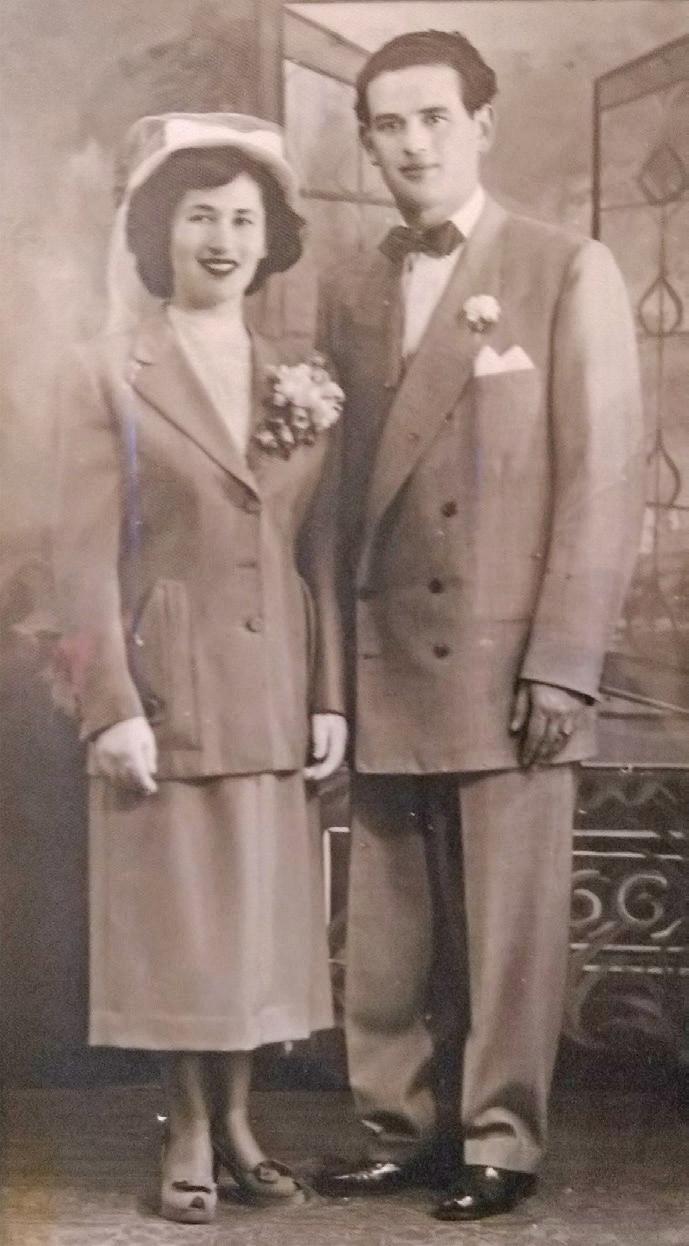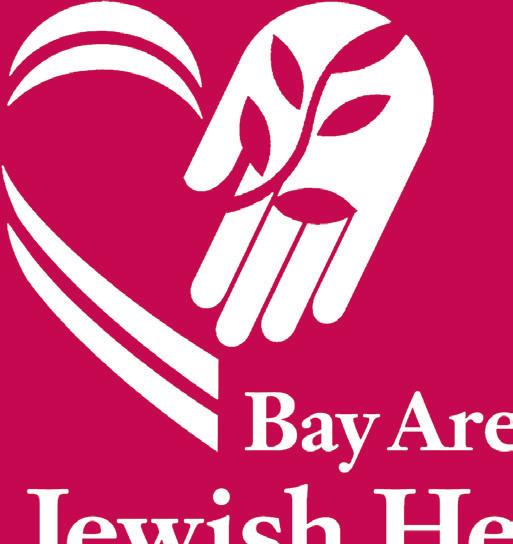
9 minute read
She spent the war in hiding, from a forest bunker to a haystack
MAYA MIRSKY | J. STAFF
Helen Fixler was 14 years old when the Nazis invaded her town. At least, she thinks so.
Advertisement
“As a matter of fact, I’m not sure of my age,” the Oakland resident said.
In her family’s desperate escape from the Nazis, they had to leave everything behind, and the years that followed were so traumatizing that many of her earlier memories were obscured. Fixler (née Nudler) spent formative years of her adolescence hiding in a forest, in a hole in the ground, staying quiet in the day and scrounging for food from the fields at night. And always, the family lived in fear of being discovered — a fear that did come to pass, with fatal consequences for almost everybody the young Helen loved.
“I think about it now and I think, how in the world I can survive so much misery?” she said sadly.
Fixler was born in Młynów, as it’s known in Polish. At the time it was an ethnically mixed region that had swung between Poland and Ukraine for years (it is now called Mlyniv and is in northwest Ukraine, close to the Polish and Belorussian borders).
She remembers a happy, Yiddish-speaking home, with a book-loving mother and four siblings, including a beloved younger sister. But anxiety began to creep into their household even before the Nazis arrived in 1941; the area was occupied by the Soviets, and the local Ukrainians were virulently anti-Semitic, Fixler said. But it became much worse once the Nazis took over, and the Nudler family and the other Jews of Młynów were rounded up.
“After a short while, we were put in a ghetto under horrible conditions, horrible conditions,” she said. “In one room, without food or anything.”
The Jews were used for forced labor, and one day, Fixler’s father heard disturbing news. “While he was out, he heard rumors that we would be exterminated,” she said.
In fear for their lives, Fixler’s parents, younger brother and sister (two older brothers had been conscripted into the Russian army), uncle and young cousins made a daring nighttime escape from the ghetto, which was surrounded by barbed wire fence.
There was nowhere to go except into the nearby forest.
“I was hiding in the woods,” she said. “My whole family ran away from the ghetto; we dug out a bunker. There were 12 of us.”
Fixler said they stayed in the forest for a couple of years, and she still remembers the brutal winters. At night they made small fires, but they had no warm clothes, only what they’d taken with them. She also remembers how hungry they were. Although they tried to stay out of sight, they had to look for scraps of food in the fields or beg for bread from villagers, which made them vulnerable.
“We were afraid,” she said. “We did it late at night. So the winters were really bad.”
The rumors her father had heard were true: The Jews in the Młynów ghetto were murdered. Even though the Nudlers had escaped that fate, they faced a harsh, uncertain and grim future.
“One day, somehow, the Ukrainians found out about us and surrounded us and started shooting,” Fixler said.
The family scattered in all directions, running from the bullets. Helen found herself alone. She never saw her mother, brother or sister again.
“They killed them in the woods, the woods,” she said. “Who knows how much they suffered.”
Polish partisans who found Fixler wandering gave her some food, and to her joy they also found her father. They were the only two in the family group who had survived.
Fixler’s father had been shot and wounded, and she described the nightmare of going in the dark to a nearby stream, where she would break the ice and wash her father’s bandages in freezing water.
Continuing their life on the run, Helen and her father came upon a farm. “We sneaked
into a stable, and in the stable was a haystack,” she said. That’s where they hid for about eight months, emerging only at night. Eventually they were spotted by the farmer’s wife, a Czech woman who let them stay there and dropped off food when her husband’s back was turned. She saved their lives, Fixler said.
Yet, after so much horror, she said she just wanted to die.
“I was very depressed all the time, and I used to cry all the time,” Fixler said, through tears. “And my dad would hug me and say, ‘Don’t cry, my child.’”
One day they heard voices in Russian and knew what that meant: The Red Army had arrived, and Fixler and her father were able to come out of hiding. After being liberated, they returned briefly to an empty Młynów, reuniting with the two older brothers who had been conscripted. There was nothing else left for them in the town, so they headed for the Pocking displaced persons camp in Germany, hoping to reach Israel or the United States. Sadly, Fixler’s father died in Germany following hernia surgery, which he had hoped would allow him to more easily immigrate as a healthy man. “Surviving the Holocaust and a short while later, dying in Germany,” Fixler said, shaking her head. In 1948 she made it to Canada, where she had relatives. That’s where she met her husband, Leonard Fixler, also a Holocaust survivor. The two moved to California in 1956 with their two daughters and joined Temple Beth Abraham in Oakland. They also had a son, who predeceased them. “We made a life for ourselves,” she said. “It wasn’t easy at the beginning.” Leonard worked in menswear and Helen became a travel agent. During her career she traveled around the world, from India to South America and the Soviet Union. But she never went back to Młynów.
“I still didn’t go to my hometown,” she said, “because I was afraid.”
Now 93 (she estimates), her mind is on the past more than ever. Leonard passed away in 2014, and Helen still sometimes wakes up at night in fear thinking that she must run from the Ukrainians, a cold reminder of the shadows of the past that still follow her. And she said she thinks of those she lost so young.
“I think of my little sister all the time,” she said, “and my brother.” n
MAYA MIRSKY Helen Fixler at home in Oakland, with her certificate of recognition from the state Legislature.

Helen and Leonard Fixler at their wedding in Canada in 1949. Profiles of Holocaust survivors, refugees and partisans in our community will appear in each issue of J. Helen Fixler (née Nudler), second from right, before the German occupation, with her parents, brothers and sister, and maternal grandmother.



A Spiritual Care Note regarding the Coronavirus
We are inundated with valuable information on the Coronavirus. It is a reminder that the miracle of modern medicine sits on the edge of discovery and anticipation. Even the common aspirin was once a hoped for combination of chemicals that would help reduce pain, and otherwise bring comfort. But, before even aspirin, someone had an idea, something they imagined at the laboratory bench, and then took a chance to try something new. Aspirin, now common-place, was once a discovery. Every drug was once the product of our God-given capacity for imagination harnessed by someone in a laboratory hoping to nd something that would help others. Hope and imagination are the corner-stones of spiritual capacity. e core of discovery is a leap of faith. Modern medicine brings us all health and healing by the way it harnesses hope, imagination, and leaps of faith.
In leaps of faith, it is as if we are like the Children of Israel. e Haggadah tells us that we are to say that we were once slaves in Egypt and led from there by God’s outstretched arm into freedom. If we really do imagine that we were there, in Egypt, then the truth is that we did not really know the end of our own story. We did not know that a sea would part, that manna would appear, that we would build a golden calf, or convenant with God at the Ten Commandments.
All we did, when we were in Egypt, was say “yes”, into the unknown. e real truth from that story is that no one knows the end of their own story, nor of a loved one’s. Yet we hope, imagine, take leaps of faith. We all come to understand whether in science, a personal decision, or how we get involved in the world, that we do it out of a hope for something we imagine can be better, for which we will take a leap of faith and discover something new. Whether your day involves a paying job or not, from not knowing if a work event will be cancelled to adjusting your daily routine, the unknown itself can yet be a place of discovery: to focus on the task we have, one moment to the next to face hope, to imagine, to discover.
All spiritual life lives in the un-known of what might yet be true. We best build a future when we include each other in our common endeavors with hope, imagination, discovery. Discovery may come in a moment of deep pain, celebration, anxiety, or an unexpected moment. But, as the sun settles into the horizon we can re ect on a day made better by the sensitivity expressed, the smiles we o ered, the engagement we entered, the leaps of faith we took and supported.
In a crisis such as this, it is important to support our common health: wash your hands, stay home if you are sick, be sure to see your doctor. And, it is, as well, where we see the spiritual life of a scientist laboring at the microscope to discover what she hopes will be a deeper understanding of how a virus works, what she imagines is how to prevent its spread, and take her leap of faith toward the discovery of treatment, even a vaccine.
We may not know when a cold wind will calm. But we can sew and when it tears, re-sew, the communal fabric into something that warms, that protects, that o ers love, that o ers care, that is ever expansive enough to hold collective uncertainty, and collective hope, to hold personal and communal anxiety and do what we can to bring discovery to the common good.










